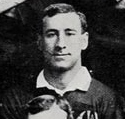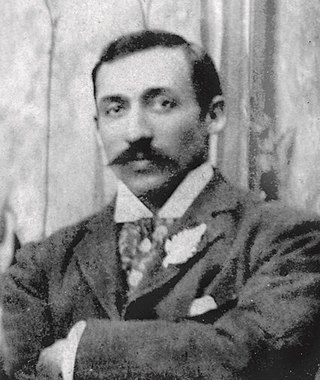Related Research Articles

The New Zealand national rugby union team, commonly known as the All Blacks, represents New Zealand in men's international rugby union, which is considered the country's national sport. Famed for their international success, the All Blacks have often been regarded as one of the most successful sports teams in history.

David Gallaher was an Irish-born New Zealand rugby union footballer best remembered as the captain of the "Original All Blacks"—the 1905–06 New Zealand national team, the first representative New Zealand side to tour the British Isles. Under Gallaher's leadership the Originals won 34 out of 35 matches over the course of tour, including legs in France and North America; the New Zealanders scored 976 points and conceded only 59. Before returning home he co-wrote the classic rugby text The Complete Rugby Footballer with his vice-captain Billy Stead. Gallaher retired as a player after the 1905–06 tour and took up coaching and selecting; he was a selector for both Auckland and New Zealand for most of the following decade.

Robert James McCarthy MBE is an Australian former professional rugby league footballer and coach. He played for the South Sydney Rabbitohs, Canterbury-Bankstown Bulldogs, New South Wales and for the Australian national side. He later coached in Brisbane, taking Souths Magpies to a premiership in 1981 and coaching the Gold Coast-Tweed Giants upon their entry to the Winfield Cup. Since 2001 he has been the chairman of both the Australian and NSW state selection panels.

Fabian Joseph Charles McCarthy was an Australian rugby union footballer who played for GPS and Toowoomba, represented Queensland at a state level, and the Wallabies at an international level.

Thomas Rangiwahia Ellison, also known as Tamati Erihana, was a New Zealand rugby union player and lawyer. He led the first New Zealand representative rugby team organised by the New Zealand Rugby Football Union (NZRFU) on their 1893 tour of Australia. Ellison also played in the 1888–89 New Zealand Native football team on their epic 107-match tour, scoring 113 points, and 43 tries with the side.
Colin "Col" Windon, was a rugby union player and soldier who captained Australia – the Wallabies – in two Test matches in 1951. By age 18 Windon was playing at flanker for his club Randwick in Sydney's Shute Shield. After serving with the Second Australian Imperial Force in the Pacific Theatre during the Second World War, Windon resumed his rugby career in 1946. He was first selected for Australia for their tour of New Zealand that year. Despite the Wallabies losing both their Tests on tour, Windon impressed with his play.
The 1912 New Zealand rugby league season was the fifth season of rugby league that had been played in New Zealand.

Patrick Keogh, also known as Pat Keogh or Paddy Keogh, was a New Zealand rugby union footballer who toured with the 1888–89 New Zealand Native football team. Playing at half-back, Keogh was considered the star player on the tour, which was the first by a Southern Hemisphere team to the British Isles. He played in at least 70 of the team's 107 matches in the British Isles, Australia and New Zealand. After playing for Dunedin club Kaikorai from 1884, he was selected to represent his province of Otago from 1887, and played for them against the touring British Isles team in 1888. By this time Keogh had established himself as the outstanding half-back in New Zealand, and he was approached by Joe Warbrick to tour with the Native team in mid-1888.
George Gothard Aitken was a rugby union footballer who represented New Zealand – known as the All Blacks – and then Scotland. He was born in Westport, New Zealand, and was selected to play provincially for Buller at the age of 16. After moving to Wellington, Aitken played for the province from 1917, and from there was selected for the All Blacks side that faced South Africa when they toured New Zealand in 1921. After only two Test matches for the All Blacks, both as captain, he was dropped from the team. In 1922 Aitken was awarded a Rhodes Scholarship and travelled to England to study at the University of Oxford. He played for the university's rugby club, and from there he was selected for Scotland. He first represented the country in 1924, and in 1925 appeared in all of their Five Nations matches; Scotland won all four of those games, and in doing so achieved their first ever Grand Slam.

George Alfred Tyler was a New Zealand rugby union player who represented New Zealand – the All Blacks – between 1903 and 1906. He played in New Zealand's first seven Test matches, including all five Tests on the pioneering Original All Blacks 1905–06 tour of the British Isles and France. He played club rugby for City in Auckland, and was selected for his province between 1899 and 1911. His brother Bill Tyler also played rugby for City and Auckland before switching codes and representing New Zealand at rugby league.

Ernest Denis Hoben was a New Zealand rugby union administrator who was the figure most responsible for the founding of the New Zealand Rugby Football Union in 1892; he was subsequently elected its first Honorary Secretary.

Henry "Norkey" Dewar was a New Zealand rugby union forward, who played for the All Blacks, and represented Taranaki and Wellington provinces.

Frederick Roberts was a rugby union footballer who played for the New Zealand national team, commonly called the All Blacks. Playing at halfback, he played for the 1905 Original All Blacks, the first New Zealand representative team to tour the British Isles. He was the only halfback taken on the tour, and played in 28 of their 32 matches in the British Isles. New Zealand rugby historian Winston McCarthy wrote of Roberts that he was "a superb passer, a judicious runner from the scrum, and excellent two-foot kicker and a giant on defence." Roberts continued to be selected by the All Blacks until 1910, when he captained the New Zealand team on their tour of Australia.

William Cunningham was a New Zealand rugby union player who represented New Zealand—known as the All Blacks—between 1901 and 1908. Most notably he toured with the Original All Blacks on their 1905–06 tour of the British Isles, France and North America. They were the first New Zealand representative team to visit the British Isles, and of their 32 matches there Cunningham played in 23. He played mainly at lock, and was added to the touring party due to his strong scrummaging ability. He played in three Test matches during the trip: against Scotland, Ireland and France, but did not play in the loss to Wales due to injury, the All Blacks' only defeat on tour.
Alexander McNaughton "Barney" Armit was a New Zealand rugby union player. He represented New Zealand on their 1897 tour of Australia, however he is best remembered for having died from injuries sustained while playing a match in 1899. He represented Otago from 1893 until his death, and played for the South Island in the Inter-Island match of 1897.

William Thomas "Tabby" Wynyard was a rugby union footballer who toured with the 1888–89 New Zealand Native football team and the 1893 New Zealand team. He also played first-class cricket for both Wellington and Auckland.
Archibald D'Arcy was a New Zealand rugby union player. D'Arcy was born and raised in Masterton, New Zealand, and first played rugby for the Red Star club before later playing with Masterton. He was first selected for Wairarapa Rugby Football Union, his provincial side, at age 16, and continued to play for them until 1894. As an administrator he represented the Wairarapa Rugby Football Union in 1891 at an inter-provincial meeting where the formation of the New Zealand Rugby Football Union (NZRFU) as first discussed. He was selected, as a fullback, for the first NZRFU-sanctioned New Zealand side, which toured Australia in 1893. Captained by Thomas Ellison, the team played eleven matches, including three against New South Wales, and lost only one. Despite being selected as a fullback, D'Arcy played two matches on the tour in the forwards.
Robert "Rab" McKenzie, was a rugby union player who represented New Zealand twice in 1893. He first played provincial rugby for Auckland in 1888, including three against the touring 1888 British Isles team. He scored Auckland's first ever try against a British Isles side in the first match, and was in the team less than a week later for the second; the second match resulted in a 4–0 loss for the tourists. He continued representing Auckland until 1891, and the following year was living in the Taranaki, for whom he played provincial rugby that season.

John Patrick Kirwan, more commonly known as "Jack Kirwan", was a rugby union and rugby league player. He represented the Hawke's Bay province and Auckland in rugby union before switching to rugby league in 1924. He was selected for the New Zealand team in 1925 becoming Kiwi number 174 in the process. His grandson was also named John Kirwan and he went on to become a famous All Black in the 1980s and 90s before also switching to rugby league.
David Lindsay "Scotty" Baird was a New Zealand international rugby union player.
References
- 1 2 3 4 5 6 7 8 9 Luxford, Bob. "Mac McKenzie". New Zealand Rugby Museum. allblacks.com. Retrieved 18 January 2017.
- ↑ McCarthy 1968, pp. 22–23.
- 1 2 McCarthy 1968, pp. 23–24.
- ↑ McCarthy 1968, p. 24.
- 1 2 McLean 1959, p. 10.
- ↑ "Obituary: Mr. William McKenzie". Evening Post. 2 July 1943. p. 3. Retrieved 19 January 2017.
- 1 2 "Death of Mr Wm. McKenzie". Weekly Times. 7 July 1943. p. 15. Retrieved 19 January 2017.
- ↑ "Deaths". The Argus. 2 July 1943. p. 2. Retrieved 19 January 2017.